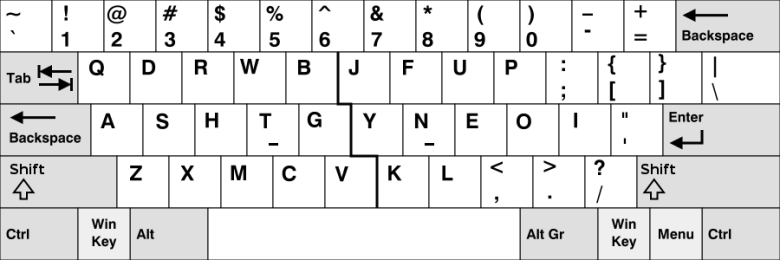The Workman keyboard layout
I have a lot of free time on my hands (heh)
I’ve been at my computer everyday, for at least 10 hours at minimum. These past ~6 - 7 months have been the most I’ve ever used my computer. Eventually, I started experiencing discomfort and pain—especially in my pinkie finger. Typing became a chore, and I found myself using my shell’s command history more just to avoid typing commands. I tried using a wrist rest, different keyboard heights, but nothing helped.
Thus began my search for a new keyboard layout, and it swiftly concluded once I chanced upon the Workman layout. According to the website, it is supposedly an improvement over Colemak and Dvorak. I skimmed through the numbers and other stats, but I honestly didn’t care. “Oh it’s better than the popular alternative layouts? Okay that’s enough for me.”

I downloaded the tarball containing the different config files for
different platforms etc. I just needed the xmodmap—that’s the
easiest way to apply a keyboard layout.
$ xmodmap xmodmap.workman
To practice the layout, I used keybr.com. You can configure the keyboard layout via the settings. Naturally, the first few days were incredibly painful. I was only able to type short sentences with very small words. I tried to not engage in heated discussions on IRC, for I could not type up a response in time. However, if I did stumble into one, I would switch back to QWERTY just for those couple of messages.
I found myself making the switch less and less, over the next few days. Chatting on IRC is a great way to learn a layout. Or chatting anywhere, really. It forces you to get accustomed to the layout by typing the common words used in conversation. I also made a tiny change to the layout—swapping the F and B keys, since typing the “fo” / “of” digram in the same hand felt really weird. Soon enough, I was averaging about 30 - 40 WPM within the first week of having switched to Workman.
And then things at work started to pick up, and I had to do what I had been dreading the most: edit code—in Vim. It’s fairly common knowledge that Vim, by default, extensively uses the H, J, K and L keys for navigation. Sure, there are better ways to move around and only using those keys is frowned upon—but it’s a habit built over years, and hard to shake off. After poking around for a bit, I found the vim-workman plugin. Forked it to apply the F/B change, and I began using it.
It was great at first. My Vim muscle memory was not hampered, as I was able to use QWERTY in normal mode, and Workman in insert. But as I got better at Workman, I found myself instinctively reaching for the Workman keys in normal mode. Well, everything except for the H, J, K and L keys. This quickly became bothersome and I uninstalled the plugin to search for a better solution.
Wait, don’t I have a sick new programmable mechanical keyboard? What if I configure a layer on it just for the H, J, K, L keys? After pouring through the manual for a bit, I eventually got it set up. I even remapped the Caps Lock key to Fn so it’s easier to access the layer. So now, hitting Caps Lock+Y/N/E/O results in HJKL being pressed. This took a little bit of getting used to, but it got easier with a bit of practice.
Since I don’t rely on any plugin/remappings, I can use Vim as is on remote machines too. Another bonus from this adventure was I actually spent time learning better ways to navigate, and reduce my reliance on HJKL. Overall, a big win.
It’s been over 4 weeks since my switch, I think, and I’m comfortably averaging around 80 WPM. Still a good 20 WPM slower than QWERTY, but I think it’ll get better with time. And am I still able to use QWERTY? Well, kinda. I still use QWERTY on my phone keyboard, since Workman isn’t an option on it and it’s actually alright. However, when I use my desktop to play Dota, I prefer using voice chat to communicate since typing on QWERTY takes too long—I am forced to hunt and peck. Interestingly, after about 15 - 20 minutes on QWERTY, my brain kinda just clicks back and I can type on it with relative ease. Not as fast as I used to be, but it’s manageable.
All things considered, switching to Workman was one of the better decisions I have made in life. It feels so nice to be able to type out whole words in just the home row. It just flows so nicely, and it has made typing so much more enjoyable again.